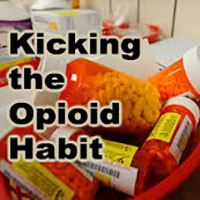Posted By Monique Dever On October 31, 2017
3 Ways (+1 bonus) EHR Data Helps Calm the Opioid Crisis

Coordinating patient information through EHR data, and shared among healthcare providers, leads to better, more focused care to patients. A complete picture emerges of the various health aspects of each individual, including physical health and mental health. In the case of licit opioid use (e.g. oxycodone) often physical health problems initially warrant opioid use, but in the end, the use of prescribed drugs can often result in the need for mental health treatment – which is the heart of the current opioid crisis.
According to American Society of Addiction Medicine (ASAM), “Drug overdose is the leading cause of accidental death in the US, and opioid addiction is driving this epidemic.” It is safe to say that there is a wide spread opioid crisis nationwide and addiction rates continue to climb. According to a Blue Cross Blue Shield study, which only measured insured members, the rates of prescribed opioid use disorder increased a whopping 493% from 2010 to 2016, with only 65% percent increase in the use of medication-assisted treatments.
EHR data (Electronic Health Records) can help substantially in the assessment and treatment for patients’ recovery from addiction. Unfortunately, mental health agencies were not included in the initial Title XI of the Social Security Act that incentivized (physical) healthcare providers to purchase and use EHRs, so there is still a high percentage of mental health agencies who have not yet adopted the practice. Recently, a Bill has been proposed to include behavioral Health, mental health and accredited substance abuse treatment centers. (More on that in another blog)
EHRs can increase awareness and gather data about a patient drug abuse history. To fight the opioid battle, EHRs are more critical in the behavioral health setting than ever before. The three main ways that EHR data can help are:
- Record and track patient (abuse) history for full picture of patient’s health
- Document assessments and treatment plans for patients trying to kick the opioid habit
- Monitor attendance and outcomes of therapy and treatment sessions
Bonus: Most importantly, by using an EHR all the collected patient data can be easily shared electronically with other providers for better overall treatment and outcomes.
Treating the mind is as essential as treating the body. If you’re not using an EHR, and connecting to other (physical) health care agencies such as public health departments, hospitals, or medical practices, don’t wait for the rules to change or a Bill passed. Make changes ahead of the curve because it is the healthy thing to do.